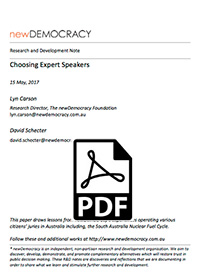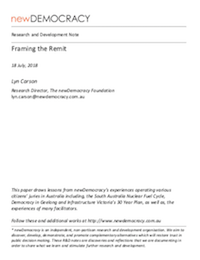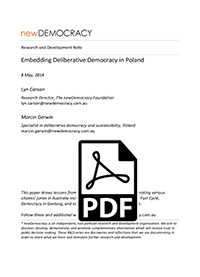Lyn Carson – Research Director, The newDemocracy Foundation
David Schecter – Associate R&D Director, The newDemocracy Foundation
What is the question?
The note “Hearing from Experts” makes the point that mini-publics need the help of experts in order to become adequately informed. To be successful in their purpose, these experts must not only be knowledgeable, but also representative of different viewpoints, respected by the mini-public members, and able to communicate effectively about their expertise with non-experts (this includes having good listening skills)1.
But who should select the experts, and how should they do it?
What are the usual answers? What are the problems with the usual answers?
Usually, decision makers select expert speakers – either from within their own networks, or from known institutions.
There are three problems with this approach. First, decision makers may not be the best people to select experts who would be best for a particular mini-public, without input from mini-public members themselves. Second, the personal networks of decision makers may not adequately cover the full spectrum of views on an issue. Third, even if decision makers make their best attempt to choose a balanced group of experts, the media and the public are likely to suspect that the selection was rigged in favour of their preferred policy options.
What alternative answer (or answers) might solve the problems?
In Australia, it used to be common practice when convening a mini-public to form a steering committee of topic experts who then selected relevant expert witnesses (e.g. the Consensus Conference on genetically-modified organisms in the food chain in 1999, or the Citizens’ Jury (CJ) on container deposit legislation (CDL) in 2000). One problem with this method is that occasionally there would be gaps in the expertise offered. For example, the Consensus Conference participants requested an ethicist and this category had not been identified by the steering committee. For the CJ on CDL, when the beverage and packaging industry speakers withdrew at the eleventh hour, a library of comprehensive information had to be assembled and the pro-CDL experts were told to stay away so that balanced information could be provided via that library of information . Citizens can spot gaps in information and will ask for additional experts or written information to fill that gap.
newDemocracy has taken on board the recommendation of a research report it funded, by the Institute for Sustainable Futures, that stakeholders have an important role to play in identifying experts. Stakeholders are now routinely engaged early in the life of any mini-public overseen by newDemocracy.
Further, newDemocracy acknowledges that citizens themselves have varying degrees of knowledge and are able to contribute their own knowledge to deliberations, but any evidence that is brought into the room by jurors or experts must be scrupulously interrogated. Hence, we have developed exercises which explore cognitive biases and enhance citizens’ capacity to interrogate their peers as well as expert speakers. (See, Critical Thinking)
How should experts be identified?
This varies, but let’s turn to the South Australian Nuclear Jury by way of example. Experts were identified by a steering committee with considerable input from government employees and an oversight committee. This gives a jury access to experts identified by others. In South Australia, there was a lengthy process of identifying experts that jurors would wish to hear from. There was also a lengthy, somewhat-chaotic session prioritising those experts. It is no mean feat to have more than 300 people decide who they should hear from. Weaknesses that can emerge are explored below.
What are the pros and cons of the alternative answers, compared to the usual answers?
Compared with selection by decision makers, these alternative approaches can produce a better balance of views, and avoid public and media suspicion of an unfair selection. They also give the mini-public members a voice in selecting the experts they will use. However, there are some possible pitfalls to be mindful of.
If given a free rein, citizens may identify ‘celebrity’ experts who have had considerable media exposure. These experts are rarely available, but they can be contacted and asked if they are available electronically, or if they can nominate another speaker who shares their position.
There is also a weakness that can emerge from confirmation bias—our tendency to want experts to confirm rather than challenge our existing views. newDemocracy is working to prevent this problem by raising awareness of confirmation bias as part of the critical thinking training given to mini-publics (See, Critical Thinking).
What important questions remain unresolved?
We note that some of the “sensitivities around evidence, evidence-giving, and evidence giver in citizens’ juries” that are outlined above, have also been canvassed in a recent study by Roberts & Lightbody (2017, p.6).
Timing is an issue that is worthy of note. There will always be the potential pitfall of identifying experts too early in a mini-public, when participants don’t know what they don’t know. This can be overcome by working first with baseline information and the provision of information by stakeholders. However, participants may also identify an expert too late to ensure their attendance.
Timing aside, let’s return to the issue of celebrity experts and people not knowing what they don’t know. How is it possible to: (1) be very thorough in determining the categories of speakers first; and (2) achieve awareness about the necessity for the whole argument to be reflected in the choice of speakers; and (3) ensuring that for every chosen speaker there is a contrary viewpoint? newDemocracy considers these as questions that must and will be answered in future mini-publics in order to ensure maximum coverage of complex issues.
Where can I find more information?
For an overview of newDemocracy’s approach to using experts with mini-publics, see R&D Note: Hearing from Experts.
Hartz-Karp, J & Carson, L (2013) “Putting citizens in charge: Comparing the Australian Citizens’ Parliament and the Australia 2020 Summit” In Carson, L, Gastil, J, Hartz-Karp, J, & Lubensky, R (Eds) The Australian Citizens’ Parliament and the future of deliberative democracy. University Park, PA: Pennsylvania State University Press
Roberts, J & Lightbody, R (2017) “Experts and Evidence in Public Decision Making” Accessed 30 March 2017
This paper draws lessons from newDemocracy’s experiences operating various citizens’ juries in Australia including, the South Australia Nuclear Fuel Cycle.
* newDemocracy is an independent, non-partisan research and development organisation. We aim to discover, develop, demonstrate, and promote complementary alternatives which will restore trust in public decision making. These R&D notes are discoveries and reflections that we are documenting in order to share what we learn and stimulate further research and development.
(1) One of the authors, Lyn Carson, was involved in both of these mini-publics. Also see reports: http://www.greencrossaustralia.org/media/40073/layreport.pdf and https://www.uts.edu.au/research-and-teaching/our-research/institute-sustainable-futures/our-research/resource-futures-0



